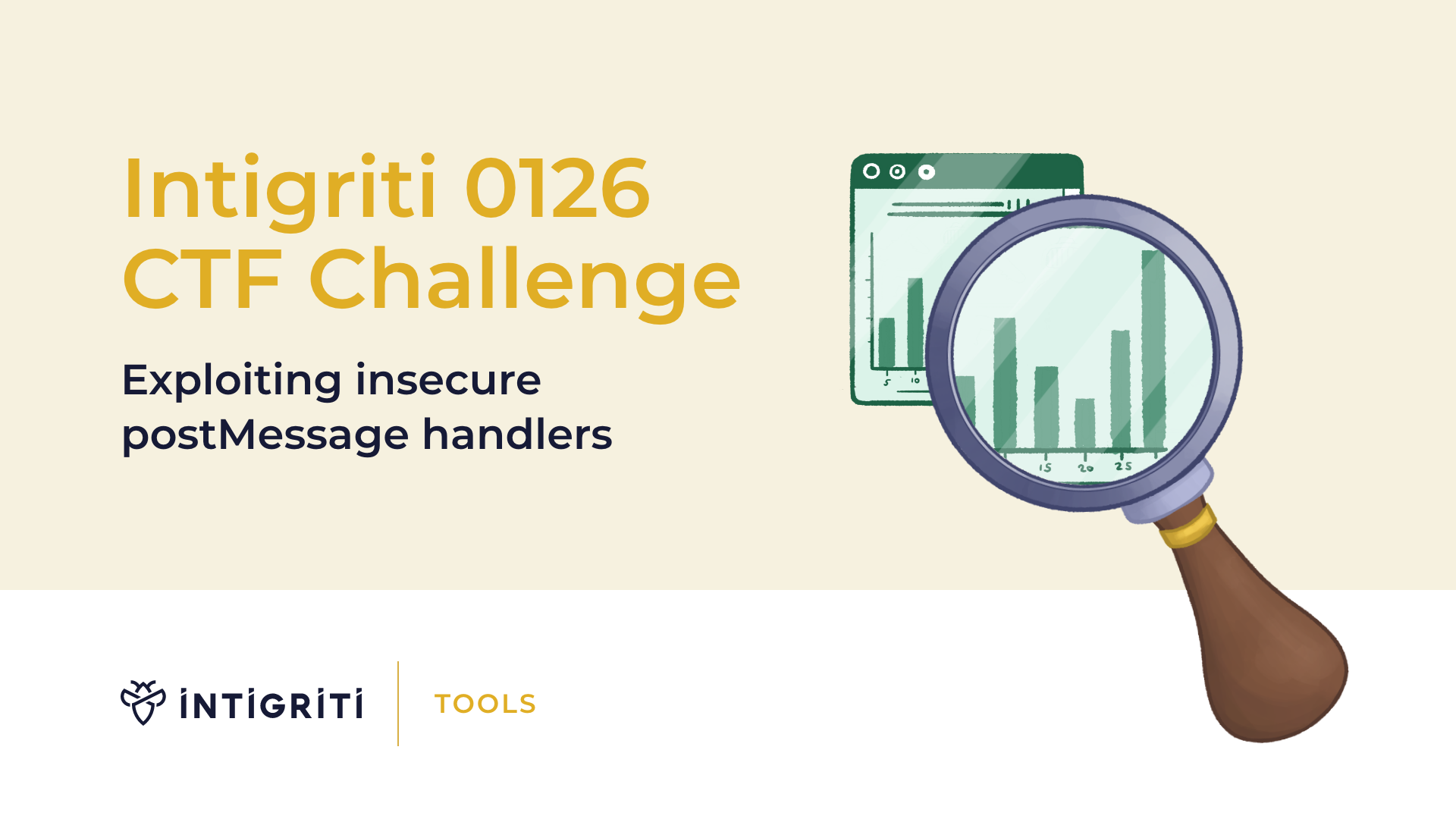Bug Bytes #33 – SSRF going wild, intigriti’s new challenge & JSON CSRF
By Intigriti
August 27, 2019
Bug Bytes is a weekly newsletter curated by members of the bug bounty community. The first series are curated by Mariem, better known as PentesterLand. Every week, she keeps us updated with a comprehensive list of all write-ups, tools, tutorials and resources we should not have missed.
This issue covers the week from 16 to 23 of August.
Intigriti news
1. WooRank premium features
Premium features are now in-scope for the Woorank project. Check out the project description for more info on how to enable them!
2. Solve the intigriti challenge & win
We announced a new XSS challenge on our Twitter profile. The challenge is simple: find a way to steal a victim’s cookies and win a Burp Pro License. It’s not too late to participate, as the challenge runs until Friday! Only three people have solved it so far — so your chances of getting a free Burp License are higher than usual!
We have tweeted out four tips so far:
This is a client-side attack that works in Chrome ONLY.
When we say “no self XSS”, we do NOT say “no obscure user interaction”
Mark my words and my URL.
Go local.
Our favorite 5 hacking items
1. Article of the week
This article is an analysis of publicly disclosed SSRF writeups.
@vickieli7 curated 76 unique reports, then read each one and categorized them following criteria like: vulnerable feature, presence of SSRF protection, criticality/impact, type of fix implemented…
She gives interesting statistics on each category. For example, 27 of the 76 bugs affected an image/file upload feature.
I love this idea of studying a vulnerability class by producing statistics based on specific criteria. This can be scaled to include other bug types and more writeups.
It’s also a great idea to look for bypasses each time you read a writeup. This is what allowed @vickieli7 to find one bug while learning about SSRF!
2. Writeup of the week
Information disclosure & SQL injection on U.S. Dept Of Defense
The chain of bugs described in this writeup are simple but critical. File/directory bruteforce revealed a Trace.axd file that redirected to a login page.
Trace.axd is ASP.NET’s trace feature that helps developers debug the app.
Tests credentials worked and gave @arinerron access to a lot of sensitive information through that debug page: tokens, passwords, new endpoints… One of them was vulnerable to SQL injection.
An interesting idea to keep in mind if you find a SSRF on an ASP.NET app, is to look for Trace.axd to escalate it.
3. Tool of the week
This is such a useful Burp extension! It’s easy to install/use, and allows you to manage a list of URLs marked as “analyzed” or “not analyzed”.
You may already be using lists of endpoints during tests to keep up with large scopes, but now you can do it directly from Burp. It allows you to highlight requests, retrieve URLs from other Burp tabs, send requests you want to analyze to Burp repeater, import/export state files…
The only downside I see is that the import/export function makes my Burp freeze. I need more RAM but the other functionalities work fine.
4. Tutorial of the week
This tutorial explains why JSON CSRF is harder to exploit than CSRF: You can’t send JSON Content-Type using an HTML form. You need AJAX which can be blocked by CORS.
So to exploit JSON CSRF, you either need to bypass CORS or one of the two techniques presented here: Change the request’s Content-Type from Content-Type: application/json to Content-Type: text/plain or to Content-Type: application/x-www-form-urlencoded.
If one of these is accepted by the server, they allow you to exploit the CSRF by creating an HTML form, bypassing the previous limitation.
5. Non technical item of the week
I would have loved to have this study years ago when I was negotiating (rather begging for) remote work with my previous employers. Home office is one of the reasons that pushed me towards self-employment.
If you’re in a similar situation, the results could help you convince management. It basically says that “If an employee has a strong track record and can do most of their work independently, research shows that allowing them to work from anywhere would benefit both the individual and organization”.
Also, the study distinguishes between Work From Anywhere (WFA, meaning geographic flexibility) and Work from Home (WFH). The first gives more flexibility and people who transitioned from WFH to WFA had their productivity increase by 4.4%!
Other amazing things we stumbled upon this week
Videos
Hackers Couch Live @ Hackerone 702 (Night 1/3) STÖK and NAHAMSEC
Hackers Couch Live @ Hackerone 702 (Night 2/3) : Bug hunting together ft FRANS ROSÉN & AVLIDIENBRUNN
Web App Testing: Episode 2 – Enumeration, XSS, and UI Bypassing
Podcasts
Risky Business #552 — Guest host Alex Stamos on all the week’s security news
News Wrap: Linux Utility Backdoor, Steam Zero Day Disclosure Drama
Webinars & Webcasts
Kerberos & Attacks 101 (Free registration required)
Conferences
Chaos Communication Camp 2019, especially:
Slides only
Tutorials
Medium to advanced
Gaining persistent access to Burp Suite’s Collaborator sessions – a step-by-step guide
Burp Suite Pro real-life tips & tricks: Authorization testing
Beginners corner
What Is Session Hijacking: Your Quick Guide to Session Hijacking Attacks
How Secure Are Encryption, Hashing, Encoding and Obfuscation?
[Metasploit] Upgrading Normal Command Shell to Meterpreter Shell
Writeups
Pentest writeups
Securing the Cloud: A Story of Research, Discovery, and Disclosure
Kerberos Resource-Based Constrained Delegation: When an Image Change Leads to a Privilege Escalation
Responsible(ish) disclosure writeups
Vulnerabilities in Ampache (<=3.9.1) #Web #CodeReview
Breaking Into Your Company’s Internal Network – SuiteCRM 7.11.4 #Web #CodeReview
When Checking the Box Results in Two Zero Days and Root (CVE-2019-14257 and CVE-2019-14258) #Web
The Many Possibilities of CVE-2019-8646 #iOS #Deserialization
FusionPBX v4.4.8 authenticated Remote Code Execution (CVE-2019-15029) #RCE #CodeReview
CVE-2019-15107: RCE in Webmin #RCE #CodeReview
PrivEsc in Lenovo Solution Centre, 10 minutes later #PrivilegeEscalation #Windows
Bug bounty writeups
ReDoS on GitLab ($1,000)
Payment tampering on Zomato ($750)
Password reset flaw ($1,000)
2FA bypass on Facebook ($500)
See more writeups on The list of bug bounty writeups.
Tools
If you don’t have time
Datajack Proxy & Introduction: Proxy for intercepting TLS in Native Applications
Exploit for CVE 2019-11510 (Pulse Secure SSL VPN Arbitrary File Disclosure), Condensed explanation of how the Pulse Secure directory traversal works, Exploitation chain & Over 14,500 Pulse Secure VPN endpoints vulnerable to CVE-2019-11510
More tools, if you have time
AuthCov: Web app authorization coverage scanning
B-XSSRF: Toolkit to detect and keep track on Blind XSS, XXE & SSRF
Shadow Workers: XSS & SW exploitation framework
ZigDiggity & Introducing ZigDiggity, a ZigBee testing framework created by Bishop Fox.
Truegaze: Static analysis tool for Android/iOS apps focusing on security issues outside the source code
NebulousAD & Introduction: Automated credential auditor for Active Directory. Checks AD user credentials against 2.5B unique passwords found in data breaches. Also k-anonymity is supposed to be implementeed
Dow Jones Hammer & Documentation: A multi-account cloud security tool for AWS. It identifies misconfigurations & insecure data exposures within most popular AWS resources, across all regions & accounts
wmiServSessEnum & Introduction: .net tool that uses WMI queries to enumerate active sessions & accounts configured to run services on remote systems
QRGen & Introduction: Simple script for generating Malformed QRCodes
GTFO: Search gtfobins and lolbas files from your terminal
Misc. pentest & bug bounty resources
Privilege Escalation Cheatsheet (Vulnhub): List of Vulnhub machines for each privilege escalation technique
APIsecurity.io Issue 45: Hacked dating apps and smartlocks, “Egregious 11” cloud security issues
Articles
Ask a Pen Tester: Q&A with Rapid7 Penetration Tester Aaron Herndon
Fingerprinting WAF Rules with Timing Based Side Channel Attacks
News
Bug bounty & Pentest news
Facebook to pay researchers to hunt down Instagram apps that abuse user data
Microsoft pushes out Chromium-based Edge with new bug bounty program: Up to $30,000 for eligible vulnerabilities in Microsoft Edge based on Chromium
The new meme for when you find an awesome bug & Long version
Vulnerabilities
VLC Media Player Allows Desktop Takeover Via Malicious Video Files
Moscow’s blockchain voting system cracked a month before election
Breaches & Attacks
No REST for the wicked: Ruby gem hacked to siphon passwords, secrets from web devs: “Developer account cracked due to credential reuse, source tampered with and released to hundreds of programmers”
Backdoor found in Webmin, a popular web-based utility for managing Unix servers
Hackers Want $2.5 Million Ransom for Texas Ransomware Attacks
Other news
Alleged “snake oil” crypto company sues over boos at Black Hat [Updated]
Facebook’s New Privacy Tool Comes With A Crucial Caveat: “Even after you turn off the ability for Facebook to collect your data to be used for ads, the social network will carry on collecting the information”
Hacker Releases First Public Jailbreak for Up-to-Date iPhones in Years
Non technical
The Difference Between Red, Blue, and Purple Teams (Updated to add Yellow, Orange, & Green Teams)
Tweeted this week
We created a collection of our favorite pentest & bug bounty related tweets shared this past week. You’re welcome to read them directly on Twitter: Tweets from 08/16/2019 to 08/23/2019.
Curated by Pentester Land & Sponsored by Intigriti
Disclaimer:
The views and opinions expressed in this article are those of the curators and do not necessarily reflect the position of intigriti.
You may also like
January 16, 2026
Intigriti Bug Bytes #232 - January 2026 🚀
Welcome to the latest edition of Bug Bytes (and the first of 2026)! In this month’s issue, we’ll be featuring: Hijacking official AWS GitHub repositories New anonymous bug bounty forum Finding more IDORs & SSRFs using a unique methodology New JavaScript file scanner to find hidden endpoints
December 18, 2025
Intigriti Bug Bytes #231 - December 2025 🚀
Welcome to the latest edition of Bug Bytes! In this month’s issue, we’ll be featuring: React2Shell scanner (with WAF bypasses) Identifying server origin IP to bypass popular WAFs CSRF exploitation cheat sheet Finding vulnerabilities in sign-ups And so much more! Let’s dive in! November’s In
November 21, 2025
Intigriti Bug Bytes #230 - November 2025 🚀
Welcome to the latest edition of Bug Bytes! In this month’s issue, we’ll be featuring: Finding an RCE using AI in GitHub CORS exploitation cheat sheet Scanning codebases with AI Bypassing paywalls SSTIs in AI models And so much more! Let’s dive in! We are thrilled to announce that Inti


























